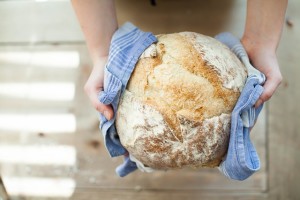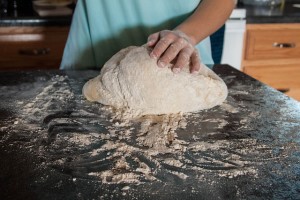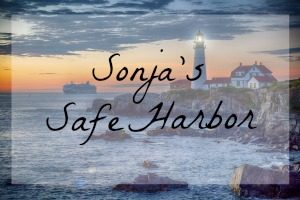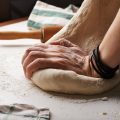This post follows up on Sonja’s last post, “Lessons I Learned From Homemade Bread.” Read it here.
 This was one of the most memorable classes for me. I knew the Spirit was there because I had no idea how to set up the learning experience and follow it through. All I knew was that I was prompted to make up the bread dough.
This was one of the most memorable classes for me. I knew the Spirit was there because I had no idea how to set up the learning experience and follow it through. All I knew was that I was prompted to make up the bread dough.
Just before turning the students loose on their task of finding the gluten in the glob of sticky bread dough, I told them the purpose of the exercise.
“For the purposes of this exercise, each one of you is a god-in-training. Each ball of dough represents a world you have created and your children in it. The starch you are to squeeze out of the ball of dough represents the hardships, evils, and distractions of this world. The water represents the refining process all people must go through in order to return home. The gluten represents your children who are seeking to return home to you for eternity. Your advancement to full godhood will be determined by your success in this exercise.”
“Let me say that again, so everyone is clear.” Then I repeated the purpose: “You will have 15 minutes to save your children.”
Everyone is at their station at the sinks. The water is gently running out of the faucet. My job is to be a silent observer, to listen and time them for 15 minutes.
“Oh yuck! This is messy!”
“This is never going to work!”
“This is stupid!”
“Oooooh, this is gross!”
“Okay, this isn’t working and I’m washing my hands of the whole mess.”
“There’s my children… Going down the drain.”
“No, no! WAIT! Let me help you! Don’t just wash all your children down the drain!”
“SLOW DOWN! She said to go slower and don’t use so much water.”
“You’re drowning your children!”
“Don’t get upset with me… It’s just a wad of stupid dough!”
“Can someone help me? My children are dying!”
“This is not fun and I don’t want to do it anymore. My children don’t care; why should I?”
“No wonder! You’re squeezing the stuffing out of your children and then drowning them!”
“I just can’t figure out how to help them. I’m no good at this.”
“I’m done! My children aren’t cooperating!”
“Oops! There goes another one down the drain.”
“Does anyone have a spare world? I think I’ve really lost this one.”
“Yuck! I’ve got this gooey mess all over me!”
“Wait! Wait! I’m saving my children… Here, let me show you how I did it!”
“Okay, everyone, let me demonstrate what worked for me…. Step by step!”
“Oooooh, yeah! Now I see what I was doing wrong!”
“Pay attention and listen!”
“Can we sing ‘I’m trying to be like Jesus’ as we bury the lost children?
The 15-minute exercise is over.
 Every student has at least a small bit of gluten in their hands. Some have a good size ball. The sinks are a mess. Some of the clothes have starchy splatters here and there. A face or two is also decorated with a starchy film. Time for a quick clean up and then back to the classroom for an “after action review.”
Every student has at least a small bit of gluten in their hands. Some have a good size ball. The sinks are a mess. Some of the clothes have starchy splatters here and there. A face or two is also decorated with a starchy film. Time for a quick clean up and then back to the classroom for an “after action review.”
During the exercise I wrote down all the ad lib comments that peppered the air as they were at the sinks. When we got back to class, I started sharing those comments with the students. I explained that the purpose of an “after action review” was to take a look at what happened in the experience as though we were a fly on the wall observing it form a different point of view. It wasn’t about judgment or criticism. It was about learning what worked well and what would we change in the event we went through the same experiment again. What could we do differently?
The conversation that resulted was unforgettable as we began to better understand how Heavenly Father is so patient with His children and doesn’t just wash us down the drain. How grateful we are for the healing and enabling gift of the Atonement that is extended to us as we accept it through dedicating our lives to following Him.
In order to summarize the learning that came from this experience, we made a list of the steps and what they symbolized.
- Mix water and whole wheat flour together to make a dough (introduction into mortality)
- Turn mixer up on high and keep beating until the mixture is completely gathered around the beater (whatever doesn’t kill you makes you stronger!)
- Take a small ball of dough in your hand and begin introducing it to small amounts of water as you begin to gently squeeze out the starch to reveal the elastic gluten (strengthened in the furnace of affliction)
- Once the starch is completely rinsed out of the gluten, you can now literally scrub the gluten under the water and it won’t separate or wash down the drain. You have revealed the protein that was hiding within the gooey dough (purification through the gift of the Atonement of Jesus Christ.)
Over thirty years have passed and I am still reflecting on that experience. By now I’m sure those students have firsthand knowledge about how life can pound you and make you feel like you are getting washed down the drain. I hope they also have firsthand knowledge about the loving, healing, and restorative influence of the Atonement as they reach out for the Savior and dedicate their lives to Him. I pray they never forget who they are, Who sent them to mortality, the purpose of their being in mortality, and the importance of remembering that their learning is far more important than their failures or their pain. We were made for such a challenging time as this — we have been reserved to come to earth in this season because we are willing to accomplish the thing which the Lord has commanded: to prepare for the return of the Savior.
Fast forward to today, March 23, 2020. As I write this blog, we are experiencing a worldwide pandemic that is systematically changing the way we are living our lives and we don’t know how long it will last. This is a “Zion’s camp” experience. We can give in to the panic and fear or we can work to strengthen the inner peace that comes from our faith in God and use it to reach out ministering to others even from our “sheltering in place” — something we can do because of the blessing of technology and social media.
In addition to our faith, the most important skill we can learn from this experience is to strengthen our capacity for feeling unconditional positive regard for humanity. There will be those all around us that are feeling very vulnerable, and you may be the exact compassionate presence that will get them through the crisis. What would your “after action review” reveal about how you manage unanticipated consequences over which you have no control? How can you reach out with your heart and lift the hearts of those in your circle of influence and concern?
Whether it is a manmade crisis like 9/11 or an act of God like the eruption of Mt. St. Helens 40 years ago, there is always something of value that comes out of the experience when you look for it. This truth is demonstrated in the following narrative from someone who experienced Mt. St. Helens:
“I was five years old when Helen’s erupted in Washington State and I remember the days and the weeks that followed very clearly.
I walked into church that bright, shining Sunday morning and two hours later as I sat in the children’s class, we were asked to go find our parents because church was releasing early. As I walked out the doors to the parking lot with my family, the air was thick with falling ash and it was pitch dark. In just two hours the world had changed, while I was singing “Jesus Wants Me for A Sunbeam.”
To read more of Sonja’s articles, click here.
We drove home with the headlights on, but it didn’t do much good. My dad had to stop the car every once in a while, open his door and sweep away the ash to see if we were still on the road. You couldn’t see anything. Once we arrived home, we filled up our bathtubs and extra buckets with water, because no one was sure if this would affect the water supplies.
For the next several weeks, we would wear masks while shoveling ash off of driveways, lawns, roads, etc. This went on forever. My dad was a water well driller and this stalled his business for a time. Farmers that were close to the eruption lost their crops in the blink of an eye. The logging industry was decimated in seconds. To me it felt like the world had been upended. It was scary and uncertain.
While some crops were destroyed, we also discovered that where the ash fell in smaller amounts, it actually brought great nutrients to the soil and also provided a layer of protection that kept moisture in the soil. Crops actually did well! Eventually the farmers plowed the ash into the ground and all those nutrients have benefitted crops through the years that followed.
Nearly 40 years later, the explosion of Mount Saint Helen’s is this cool little blip in history, but to the people I lived with in Central/Eastern Washington it was a nightmare.
I’m saying all of this to reassure a generation of young adults who may not remember massive disasters, who may not realize that we have been through incredibly hard times before and we will make it through this. We will find the way. We will come out of this changed and stronger and smarter and HOPEFULLY, more compassionate, more willing to care for our neighbor and more focused on preparing ourselves mentally, spiritually, emotionally and physically for the next big challenge. Because another challenge will come and we will meet it. We need the dads and moms and grandparents and aunts and uncles of tomorrow to be ready to do what needs to be done each day.
Sometimes the ash of a disaster can offer some unexpected blessings, but we have to be ready and willing to till it into our soil.”
– Camiah Mingorance, Yakima, Washington
I ran across a poem from Richard Hendrick that expresses the good that is coming from this COVID19 “Zion’s Camp” pandemic.
How we react to this pandemic will be a type for how we live our lives. The Lord is preparing His children to gain the strength to weather all the events that we will experience as we approach the Second Coming of Jesus Christ. Never forget: Inner peace is a personal choice. Choose.
Sonja lives with her husband, Dale, on Anderson Island, Washington. She and her husband are Church Service Missionaries serving in the Addiction Recovery Program, focusing on pornography and sex addiction. She is also a certified life coach and teaches “Life Skills for Emotional Self-Mastery” in her stake twice a month. She does not teach you only to process something traumatic done to you in the past; rather, she helps you learn to feel it, heal it, and LET GO of whatever you still do to yourself and to others in order to cope with what was done to you in the past.







